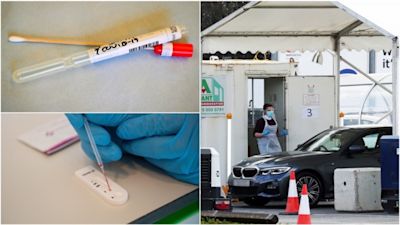Population-wide coronavirus testing planned

Population-wide mass testing for coronavirus is being planned, the Health Secretary has said.
Matt Hancock said ministers are “working as fast as we can” to achieve the “moonshot” of mass testing so restrictions can be eased.
Some have called for a mass-testing regime to be adopted to keep levels of Covid-19 in check.
Mr Hancock told ITV News: "We want to see a huge expansion of testing ... the survey where we test people to find out where the virus is; that survey is expanding by 10 times so we have much more detail, granular, localised understanding of where the virus is spreading.
"It's our single most important piece of information that comes out each week in terms of how the virus is progressing and how we are keeping a lid on it.
"It's been such an important tool in the decision making that we're expanding it massively.
"This means that we'll be able to spot an area that's had a rise in cases that might need a local lockdown, to spot that earlier and be able to have a more focused response."
He earlier told BBC Radio 4: “The new technologies for testing that are coming on stream now are incredibly important. At the moment you have to send off a test to a laboratory and get it back and all the logistics of that takes time, it’s also quite expensive.
“We’re testing some of these right now in Porton Down, in our scientific labs, and the mass testing, population testing, where we make it the norm that people get tested regularly, allowing us therefore to allow some of the freedoms back, is a huge project in Government right now with enormous support.”
Test and trace system defended amid claims it is nowhere near 'world beating'
Local tracing teams far more successful than call centres and online
Check coronavirus cases in your area with our interactive map
But when pressed on the issue, Mr Hancock declined to say when mass testing would be available.
“We’re ramping it up over the remainder of this year. I’m not going to put a firm deadline on it. The answer is we’re working as fast as we can,” he said.
“This moonshot to have testing ubiquitous and available to reopen all sorts of things to reduce the burden of the quarantine arrangements, which nobody wants to have in place, to allow us to reopen parts of the economy, that is an incredibly important project within Government right now.”
It has been suggested that routine mass testing could see a return of packed sports stadiums and live music events, with other parts of society able to operate more safely.
Initial testing capabilities would not have been able to cope with a population-wide programme – with some tests taking days to be returned.
But the recent introduction of rapid tests – some providing results in as little as 90 minutes – have changed the way tests can be delivered.
Mr Hancock was speaking as the Government faced criticism for axing the public health body in England in the middle of the pandemic.
Critics have expressed dismay Public Health England (PHE) is being dismantled during the crisis, but Mr Hancock said delaying the change would have been “wrong”.
The new National Institute for Health Protection (NIHP) will take in some of PHE’s responsibilities along with the NHS Test and Trace programme and the work of the Joint Biosecurity Centre.
The organisation, headed by Tory peer Dido Harding, will respond to health threats including infectious diseases, pandemics and biological weapons, he said.
In other developments:
– Heathrow Airport announced the development of a new coronavirus testing facility it hopes will lead to the end of the mandatory 14-day quarantine for people returning from certain countries, and to “protect the economy”.
– Health officials announced plans to ramp up the coronavirus infection survey across Britain. The Office for National Statistics research aims to increase to include 400,000 people – up from the current 28,000.
– Data from official agencies across Britain show more than 57,000 deaths involving Covid-19 have been registered in the UK.